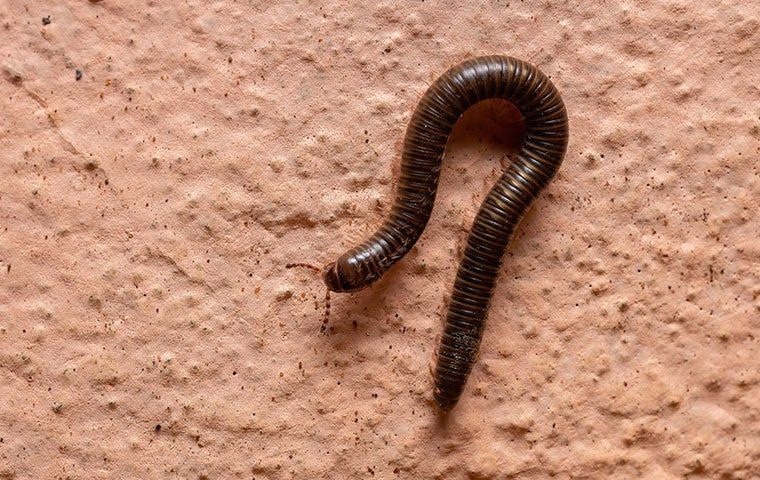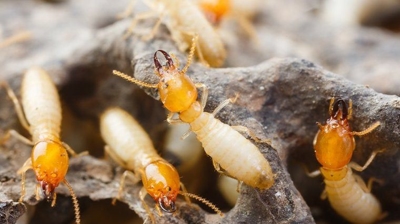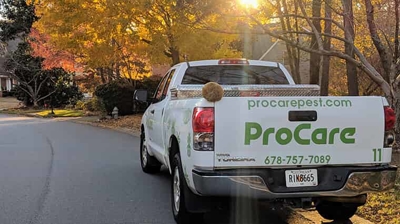
Centipede & Millipede Identification & Prevention

About Centipedes & Millipedes
Centipedes and millipedes are pests that find their way into our homes when outdoor living conditions become unfavorable. If you are struggling with a centipede or millipede infestation, contact our residential pest technicians at Procare Pest Services for exterminator solutions throughout our Georgia service areas.
Frequently Asked Questions About Centipedes & Millipedes
Have questions? We are here to help. Still have questions or can't find the answer you need? Give us a call at 678-757-7089 today!
-
What are centipedes and millipedes?
Centipedes and millipedes are both types of arthropods that belong to the class Chilopoda. These critters are nuisance pests that invade homes or businesses whenever conditions for survival outdoors are inhospitable. Their preferred living locations are not inside human structures but rather outside in humid areas.
Around your home or business, you are most likely to encounter centipedes and millipedes in basements, crawl spaces, bathrooms, and kitchens, where they hide in secluded, dark, and humid areas.
- Centipedes: Even though 'centipede' means 'one hundred footed,' not every centipede has one hundred feet. The number of feet that a centipede has depends on how many segments its body has and the species. In general, centipedes will have between fifteen and one hundred and seventy-seven pairs of legs, one pair per body segment. Centipedes range in color from brown and grey to red, green, and blue, and they appear wormlike with flattened bodies. Centipedes are carnivorous and mostly eat spiders, worms, and other soft-bodied insects.
- Millipedes:Similar to the centipede's name, 'millipede' means 'one thousand footed,' but no known millipede species today are found to actually have one thousand feet. For the most part, millipedes will have between forty and four hundred legs, with two pairs of legs per body segment. Millipedes are black, brown, or grey, but some species may have orange or red markings visible on their bodies. Millipedes enjoy eating decaying organic matter.
-
Can centipedes and millipedes cause problems?Besides being unsightly visitors to your home, centipedes and millipedes may bring other problems. Certain species of centipedes can be poisonous, and they may bite, injecting venom through their front legs. This venom can cause itchiness, rash, or an uncomfortable stinging sensation. Similarly, when threatened, millipedes will secrete defensive fluids; these are not poisonous, but they may cause a rash or allergic reaction in certain individuals. It is important to keep both centipedes and millipedes out of your house to avoid the potential negatives of encountering these pests.
-
How do I prevent centipedes and millipedes in the future?
You can take steps to prevent a centipede or millipede infestation by following our expert tips below
- Keep centipedes and millipedes out by sealing cracks around windows and doors.
- Ensure that exterior doors and windows as closed as often as possible and invest in window and door screens to keep these pests out.
- Fix moisture and drainage issues around your property that create the moist conditions centipedes and millipedes love so much.
- Address pest prey issues around your property with the help of ProCare Pest Services to decrease centipede food sources.
- Cut back long grass and remove outdoor debris, so millipedes have less food, and both centipedes and millipedes have reduced hiding spaces.
If you are still struggling with a centipede or millipede infestation despite putting prevention tips into place, contact our expert residential and commercial pest technicians at ProCare Pest Services for further assistance and pest removal.

Stay In The Know
-
 How to Tell If There’s Wildlife Activity in Your Home (and What to Do About It)Read More
How to Tell If There’s Wildlife Activity in Your Home (and What to Do About It)Read More -
 Keep Your Atlanta Home Fly-Free: How Procare Manages House Flies, Fruit Flies, and Other Nuisance FliesRead More
Keep Your Atlanta Home Fly-Free: How Procare Manages House Flies, Fruit Flies, and Other Nuisance FliesRead More -
 DIY pest control?Read More
DIY pest control?Read More -
 Procare: The Best Pest Control Solutions for Atlanta BusinessesRead More
Procare: The Best Pest Control Solutions for Atlanta BusinessesRead More -
 3 Signs You Might Have a Termite Problem in Atlanta—and How to Spot Them EarlyRead More
3 Signs You Might Have a Termite Problem in Atlanta—and How to Spot Them EarlyRead More -
 Your Year-Round Defense Against Fall Bugs and Joro Spiders in AtlantaRead More
Your Year-Round Defense Against Fall Bugs and Joro Spiders in AtlantaRead More -
 How To Solve Any Fall Pest issue in 2024Read More
How To Solve Any Fall Pest issue in 2024Read More -
 Keeping Spiders Out Of Your HomeRead More
Keeping Spiders Out Of Your HomeRead More









